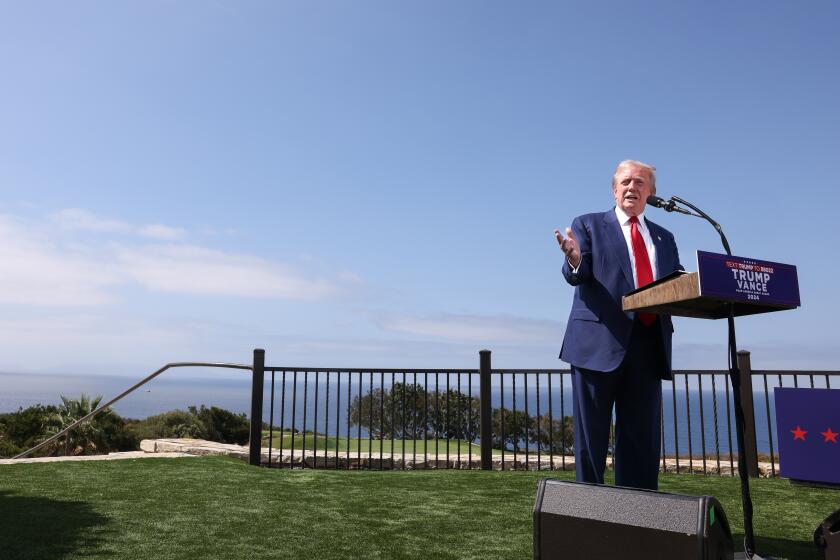A humbled president
WHERE DID IT ALL GO? Less than a year ago, a triumphant President Bush bragged of the political capital he’d earned with his reelection, and of his intention to spend it. Now the capital is all gone, and Bush has precious little to show for it.
The administration and Republican congressional leaders did conclude some of their pending business from the first term -- including tort reform, an energy bill and the Central American Free Trade Agreement. But the White House’s signature domestic initiative for the second term -- a partial privatization of Social Security -- proved dead on arrival.
Second terms are notoriously humbling for presidents, whose hubris tends to peak shortly after reelection. Watergate, Iran-Contra and the Lewinsky affair were all second-term scandals exacerbated by the arrogance of White House occupants who’d come to think of themselves as invincible.
Yet Bush’s second-term implosion is remarkable for its suddenness. Bush has been deprived of even one good year after his reelection. His approval ratings are at a record low, and some Republican lawmakers are already treating him as a lame duck. The war in Iraq has sapped much of the administration’s political vitality, as each promised watershed has failed to alter the grim realities on the ground.
Then came Katrina, delivering its frontal assault on the core promise of the Bush presidency: to do whatever it takes to protect the American homeland. Who could have guessed it would be a hurricane, not a terrorist incident, that would make Americans question the competence of their commander in chief?
Politics are cyclical, so the president’s early second-term implosion offers him more opportunity to recover than a president caught in a scandal in his penultimate year in office. As the old college saying goes, the sooner you fall behind, the more time you have to catch up. And Bush has shown signs of adjusting to his humbler circumstances.
Much of the bravado is gone. Bush accepted responsibility for a failing, in the aftermath of Katrina. His nomination of John G. Roberts Jr. to the Supreme Court, and his willingness to work alongside China and Japan to resolve North Korea’s nuclear brinksmanship, were both sensible moves.
Bush’s second Supreme Court nomination, expected this week, will be an important test of the White House’s commitment to set a new course. The president would be well advised to pick another justice like Roberts; he can hardly afford to pick a radical ideologue to please social conservative activists.
The White House’s other challenges are daunting, starting with the need to define a successful exit strategy from Iraq and overseeing the reconstruction of New Orleans. In terms of a meaningful legacy, Bush should focus on three nettlesome projects that will require an energetic sales job on Capitol Hill: overhauling the nation’s antiquated immigration laws, developing a coherent energy strategy and moving to dismantle farm subsidy programs that drain the national treasury and jeopardize the global trading system. Bush may also have to forgo some extensions of his tax cuts.
The disarray within GOP congressional ranks in the aftermath of Rep. Tom DeLay’s indictment won’t make things easier for Bush. But it may be another signal to the president that he now needs to reach across party lines to get things done.
A move by Bush to recast himself as a “uniter, not a divider” (where have we heard that before?) would certainly be a departure from his first term, and it isn’t certain that the White House is sold on the idea quite yet. Then again, it may be the president’s best choice if he doesn’t want to be a lame duck for the next three years.
More to Read
Get the L.A. Times Politics newsletter
Deeply reported insights into legislation, politics and policy from Sacramento, Washington and beyond. In your inbox three times per week.
You may occasionally receive promotional content from the Los Angeles Times.










